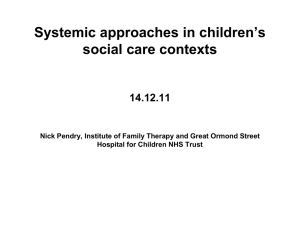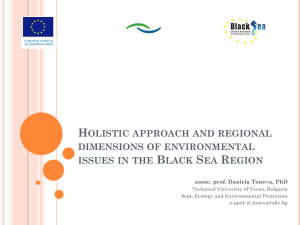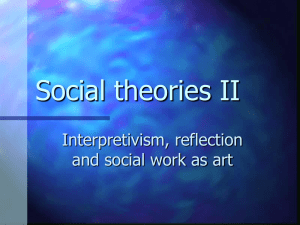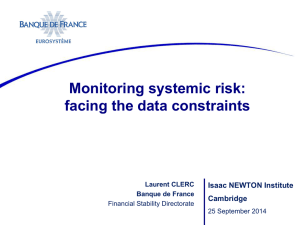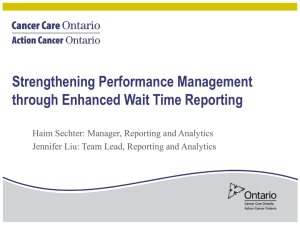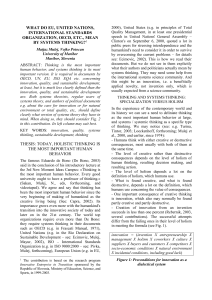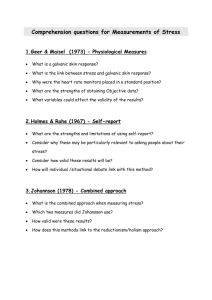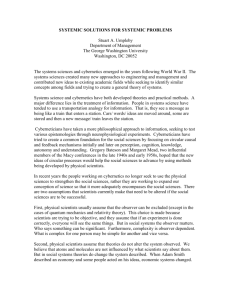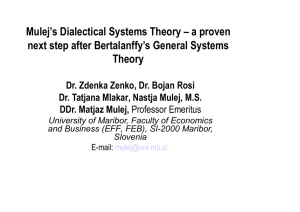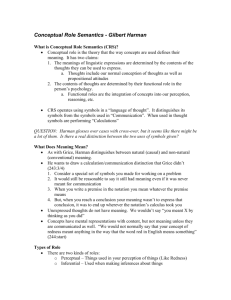Social Responsibility As A Next Step In Development of Systemic
advertisement
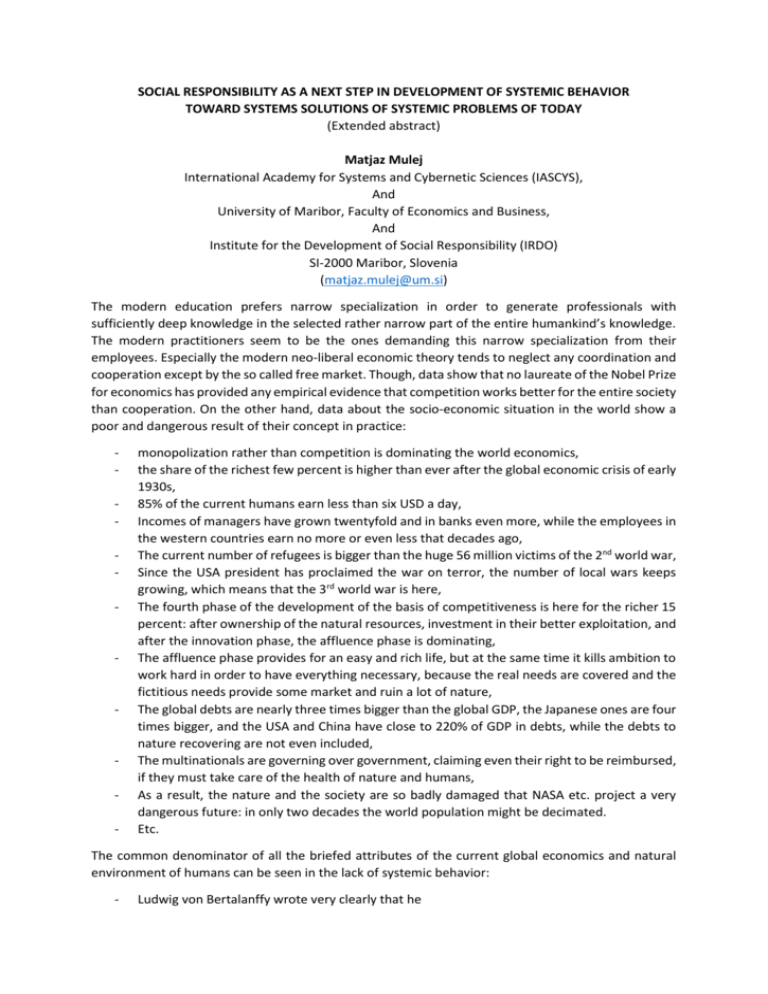
SOCIAL RESPONSIBILITY AS A NEXT STEP IN DEVELOPMENT OF SYSTEMIC BEHAVIOR TOWARD SYSTEMS SOLUTIONS OF SYSTEMIC PROBLEMS OF TODAY (Extended abstract) Matjaz Mulej International Academy for Systems and Cybernetic Sciences (IASCYS), And University of Maribor, Faculty of Economics and Business, And Institute for the Development of Social Responsibility (IRDO) SI-2000 Maribor, Slovenia (matjaz.mulej@um.si) The modern education prefers narrow specialization in order to generate professionals with sufficiently deep knowledge in the selected rather narrow part of the entire humankind’s knowledge. The modern practitioners seem to be the ones demanding this narrow specialization from their employees. Especially the modern neo-liberal economic theory tends to neglect any coordination and cooperation except by the so called free market. Though, data show that no laureate of the Nobel Prize for economics has provided any empirical evidence that competition works better for the entire society than cooperation. On the other hand, data about the socio-economic situation in the world show a poor and dangerous result of their concept in practice: - - - - monopolization rather than competition is dominating the world economics, the share of the richest few percent is higher than ever after the global economic crisis of early 1930s, 85% of the current humans earn less than six USD a day, Incomes of managers have grown twentyfold and in banks even more, while the employees in the western countries earn no more or even less that decades ago, The current number of refugees is bigger than the huge 56 million victims of the 2nd world war, Since the USA president has proclaimed the war on terror, the number of local wars keeps growing, which means that the 3rd world war is here, The fourth phase of the development of the basis of competitiveness is here for the richer 15 percent: after ownership of the natural resources, investment in their better exploitation, and after the innovation phase, the affluence phase is dominating, The affluence phase provides for an easy and rich life, but at the same time it kills ambition to work hard in order to have everything necessary, because the real needs are covered and the fictitious needs provide some market and ruin a lot of nature, The global debts are nearly three times bigger than the global GDP, the Japanese ones are four times bigger, and the USA and China have close to 220% of GDP in debts, while the debts to nature recovering are not even included, The multinationals are governing over government, claiming even their right to be reimbursed, if they must take care of the health of nature and humans, As a result, the nature and the society are so badly damaged that NASA etc. project a very dangerous future: in only two decades the world population might be decimated. Etc. The common denominator of all the briefed attributes of the current global economics and natural environment of humans can be seen in the lack of systemic behavior: - Ludwig von Bertalanffy wrote very clearly that he o o - - had created his General Systems Theory against the over-specialization, sees no bright future unless humans become citizens of entire world rather than of single countries and care for the entire nature rather small pieces of it only; o the notion system covers holism/wholeness rather than a narrow specialization; it relates to concepts that used to be considered metaphysical rather than scientific (because science developed the narrow specialization and delimitation of single (sub) disciplines. Norbert Wiener created his Cybernetics in interdisciplinary creative cooperation; Therefore, not every complex part of the real life, even less every single topic of consideration may be called a system, but only the one that is worked on in an interdisciplinary creative cooperation – of the interdependent professionals. Both Bertalanffy and Wiener are poorly considered now, which causes very dangerous consequences for humankind and its natural preconditions of survival. In the late 20th century the concept of social responsibility started to be changed from being nice and do charity to a much broader concept that is very close to an indirect revival of systemic behavior. In 2010 these efforts resulted in the international advisory standard ISO 26000 with its three basic notions: - Social responsibility is defined as everyone’s responsibility for their influences on humans and nature, i.e. on society; The seven basic contents are summarized in a circle, which is broken at its bottom for the concept interdependence, At the top the same circle is broken for the concept holism. These three notions summarize the essence of the concepts of the (grand-) fathers of systems theory and cybernetics, briefed here earlier. What is added to their concepts is important too: - The seven principles fortifying the mentioned three basic notions; The seven steps of making the systemic behavior by social responsibility the practice. The ISO 26000s seven steps of integration of SR can be divided in two groups (author's note): a) Insight into the given practice: 1 the relationship of an organization’s characteristics to SR 2 understanding the SR of an organization 3 practices for integrating SR throughout an organization b) Resulting action for more SR: 4 communication on SR 5 enhancing credibility regarding SR 6 reviewing and improving an organization’s actions and practices related to SR 7 voluntary initiatives for SR. Thus, the seven principles of SR can become reality: 1 accountability 2 transparency 3 ethical behavior (Ethical behavior is defined as: values of honesty, equity and integrity, i.e.: concern for people, and the environment and commitment to address the impact of its activities and decisions on stakeholders’ interests.) 4 respect for stakeholder interests 5 respect for the rule of law 6 respect for international norms of behavior 7 respect for human rights. On this basis, the humankind has a better chance of survival. The seven core subjects cover everything essential; they are quoted in ISO 26000 (ISO, 2010): governance, management, organization; labor practices; environment; fair business practices; customers; human rights; community involvement and development. They are to be considered in interdependence and synergy based on two linking concepts: interdependence, and holism. ISO 26000 states very correctly: “An organization should look at the core subjects holistically, that is, it should consider all core subjects and issues, in their interdependence, rather than concentrating on a single issue. Organizations should be aware that efforts to address one issue may involve a trade-off with other issues. Particular improvements targeted at a specific issue should not affect other issues adversely or create adverse impacts on the life cycle of its products or services, on its stakeholders or on the value chain.” This clear definition requires the concept of holism and hence the concept of holism and wholeness to be more clearly defined as many authors in systems theory and cybernetics do due to their specialization, which contains little or no education in interdisciplinary creative cooperation. This requirement recalls and supports systemic behavior (more in Mulej et al., 2013) and hence requires any effort to meet the Mulej and Kajzer (1998) law of requisite holism that states: • Holism that is restricted to one single viewpoint is fictitious and misleading, making people forget that other viewpoints explore other parts of attributes of the same reality, and their insights are complementary to the ones from ‘our’ viewpoint. • Holism is real only, when it is total to cover totally all attributes from totally all viewpoints and totally all their synergies. This reaches beyond human capacities, even in a team’s interdisciplinary creative cooperation. • Hence, the requisite holism lies between these two extremes. It can be defined only for every single case; authors must accept their responsibility for their choice of their selected ‘dialectical system’, i.e., their synergetic network of their selected essential viewpoints and relations and resulting synergies. ISO 26000 is supported by the European Union (2011) as the way out from the current crisis; equal support is offered by several international organizations, including the ones of enterprises. Thus, the real humankind’s problem are the most influential and greedy individuals and their global corporations. They are ruining the entire world, including the world of their own children and grandchildren, by their big impact and lack of social responsibility, i.e. systemic behavior. To them, the war is no problem, but a chance for profit, while the broader and more long-term consequences are left aside. Thus, the problems of survival of humankind are hidden more in values, culture, ethics, and norms, than in scientific knowledge: - Education should go in the direction ‘knowledge-cum-values’ rather than knowledge alone, - Practitioners should require, and get, professional with o ethic of interdependence, o capacity of and deep devotion to interdisciplinary creative cooperation rather than individualism with overspecialization, the rather broad and long-term criteria of efficiency and effectiveness. Happiness of humankind and survival of humankind are the basic unavoidable goals, profit is one of several tool supportive of these goals. The alternative is the end of the current civilization, nothing less. This is why systemic solutions to systemic problems are urgent.

